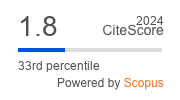Comparison of Kernel Support Vector Machine Multi-Class in PPKM Sentiment Analysis on Twitter
Abstract
PPKM is the Indonesian government's policy to deal with the spread of the coronavirus since early 2021. Until now, PPKM is still the main topic to prevent the spread of COVID-19. This policy has generated various responses from the public, especially on Twitter. A sentiment analysis process is needed to process the text obtained from Twitter. Sentiment analysis is a form of representation of text mining and text processing. This study aims to analyze public sentiment towards PPKM through data obtained from Twitter using the multi-class SVM algorithm. In implementing multi-class SVM, an analysis of the Polynomial and RBF kernels was carried out on the One Against One and One Against Rest methods which showed that the combination of One Against Rest and the Polynomial kernel was obtained the best accuracy, which was 98.9%. Unlike the case with the combination of One Against One and Kernel RBF, which obtained the worst accuracy, 77.6%. The best model produces precision, recall, and f1-score values of 97%, 98%, and 97%. Based on the confusion matrix results, the best model has a positive class distribution = 912, neutral = 51, and negative = 26. Overall, the polynomial kernel model produces higher accuracy; both applied to the One Against One and One Against Rest methods. In contrast, the RBF kernel model produces lower accuracy and is significantly different when applied to the One Against One and One Against Rest methods. The model results show that public sentiment towards the PPKM policy is positive to be continued consistently to suppress the spread of the COVID-19 virus.
Downloads
References
H. Andriani, “Effectiveness of large-scale social restrictions (PSBB) toward the new normal era during COVID-19 outbreak: a mini policy review,” journal of indonesian health policy and administration, vol. 5, no. 2, 2020.
T. Krisdiyanto, “Analisis sentimen opini masyarakat Indonesia terhadap kebijakan PPKM pada media sosial Twitter menggunakan naïve bayes clasifiers,” Jurnal CoreIT: Jurnal Hasil Penelitian Ilmu Komputer dan Teknologi Informasi, vol. 7, no. 1, pp. 32–37, 2021.
M. Syarifuddin, “Analisis Sentimen Opini Publik Terhadap Efek Psbb Pada Twitter Dengan Algoritma Decision Tree-KNN-Naïve Bayes,” INTI Nusa Mandiri, vol. 15, no. 1, pp. 87–94, 2020, doi: 10.33480/inti.v15i1.1433.
A. Subagyo, “Sinergi Dalam Menghadapi Ancaman Cyber Warfare,” Jurnal Pertahanan & Bela Negara, vol. 5, no. 1, pp. 89–108, 2018.
S. R. M. Pakpahan, Indriati, and Marji, “Analisis Sentimen Tentang Opini Performa Klub Sepak Bola Pada Dokumen Twitter Menggunakan Support Vector Machine Dengan Perbaikan Kata Tidak Baku,” Jurnal Pengembangan Teknologi Informasi dan Ilmu Komputer, vol. 3, no. 7, pp. 7259–7267, 2019, [Online]. Available: http://j-ptiik.ub.ac.id/index.php/j-ptiik/article/view/5908
D. Musfiroh, U. Khaira, P. E. P. Utomo, and T. Suratno, “Analisis Sentimen terhadap Perkuliahan Daring di Indonesia dari Twitter Dataset Menggunakan InSet Lexicon: Sentiment Analysis of Online Lectures in Indonesia from Twitter Dataset Using InSet Lexicon,” MALCOM: Indonesian Journal of Machine Learning and Computer Science, vol. 1, no. 1, pp. 24–33, 2021.
D. Alita, Y. Fernando, and H. Sulistiani, “Implementasi Algoritma Multiclass SVM pada Opini Publik Berbahasa Indonesia di Twitter,” Jurnal Tekno Kompak, vol. 14, no. 2, pp. 86–91, 2020.
X. He, Z. Wang, C. Jin, Y. Zheng, and X. Xue, “A simplified multi-class support vector machine with reduced dual optimization,” Pattern Recognition Letters, vol. 33, no. 1, pp. 71–82, 2012.
H. Tuhuteru and A. Iriani, “Analisis Sentimen Perusahaan Listrik Negara Cabang Ambon Menggunakan Metode Support Vector Machine dan Naive Bayes Classifier,” Jurnal Informatika, vol. 3, no. 03, 2018.
A. Budianto, R. Ariyuana, and D. Maryono, “Perbandingan K-Nearest Neighbor (KNN) Dan Support Vector Machine (SVM) Dalam Pengenalan Karakter Plat Kendaraan Bermotor,” Jurnal Ilmiah Pendidikan Teknik dan Kejuruan, vol. 11, no. 1, pp. 27–35, 2018.
A. Nurkholis, Z. Abidin, and H. Sulistiani, “Optimasi Parameter Support Vector Machine Berbasis Algoritma Firefly Pada Data Opini Film,” Jurnal RESTI (Rekayasa Sistem Dan Teknologi Informasi), vol. 5, no. 5, pp. 904–910, 2021.
S. Styawati and K. Mustofa, “A Support Vector Machine-Firefly Algorithm for Movie Opinion Data Classification,” IJCCS (Indonesian Journal of Computing and Cybernetics Systems), vol. 13, no. 3, pp. 219–230, 2019.
A. I. S. Azis, V. Suhartono, and H. Himawan, “Model Multi-Class SVM menggunakan strategi 1V1 Untuk Klasifikasi Wall-Following Robot Navigation Data,” Jurnal Cyberku, vol. 13, no. 2, p. 8, 2017.
A. A. Salih and A. M. Abdulazeez, “Evaluation of classification algorithms for intrusion detection system: A review,” Journal of Soft Computing and Data Mining, vol. 2, no. 1, pp. 31–40, 2021.
R. M. AlZoman and M. J. F. Alenazi, “A comparative study of traffic classification techniques for smart city networks,” Sensors, vol. 21, no. 14, p. 4677, 2021.
Copyright (c) 2022 Jurnal RESTI (Rekayasa Sistem dan Teknologi Informasi)

This work is licensed under a Creative Commons Attribution 4.0 International License.
Copyright in each article belongs to the author
- The author acknowledges that the RESTI Journal (System Engineering and Information Technology) is the first publisher to publish with a license Creative Commons Attribution 4.0 International License.
- Authors can enter writing separately, arrange the non-exclusive distribution of manuscripts that have been published in this journal into other versions (eg sent to the author's institutional repository, publication in a book, etc.), by acknowledging that the manuscript has been published for the first time in the RESTI (Rekayasa Sistem dan Teknologi Informasi) journal ;








